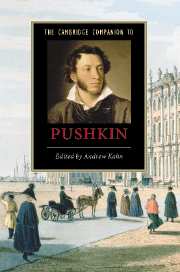Appendix on verse-forms
Published online by Cambridge University Press: 28 March 2007
Summary
The standard metrical unit in Russian versification is the foot. A foot is composed of two (binary metres) or three syllables (ternary metres). The alternation of stressed or unstressed syllables determines the type of foot. Russian words have a single stress and the placement of that stress is inherent. The most common foot in Russian poetry is the iamb, consisting of an unstressed syllable followed by a stressed syllable. The second most common foot is the trochee, consisting of a stressed syllable followed by an unstressed syllable. The number of feet, normally between two and six, determines the length of the line. Hence the iambic tetrameter consists of four iambic feet (composed of eight or nine syllables), and the iambic pentameter consists of five iambic feet (composed of ten or eleven syllables). Iambic tetrameter was the metre of choice for narrative verse and lyric poetry in the early nineteenth century. Many of Pushkin’s narrative poems, including Ruslan and Liudmila, The Fountain of Bakhchisarai, The Gypsies and The Bronze Horseman are written in this metre, using an irregular rhyme scheme that mixes couplets and alternating rhyme. Further features that add expression and variety to poetic speech are rhythm, intonation and enjambment. Rhythm is the result of the actual rather than theoretical stress pattern. In the standard iambic line the words, ordered according to rules of syntax, fall into a pattern of alternating unstressed and stressed syllables. In an iambic line of eight or nine syllables the metre calls for up to four metrical stresses.
- Type
- Chapter
- Information
- The Cambridge Companion to Pushkin , pp. 221 - 223Publisher: Cambridge University PressPrint publication year: 2006



